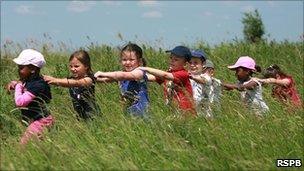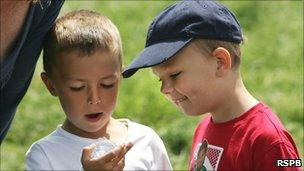Childhood outdoor pastimes 'in decline'
- Published

Junior school children getting to grips with the natural environment
Traditional childhood pastimes of climbing trees and playing conkers are in decline, according to the RSPB.
People under 34 recall far fewer such childhood outdoor experiences than their counterparts over 55, according to a survey by Ipsos Mori for RSPB.
The RSPB's Every Child Outdoors report also highlights how poorer children experience less of nature.
The charity is to meet MPs to promote more teaching of nature for children.
Declining numbers
Ipsos Mori asked the public which of 12 outdoor experiences they remembered having as a child.
These included making dens, daisy chains, climbing trees, playing conkers and feeding birds.
Four out of five boys climbed trees and the same number of girls made daisy chains.
But the survey showed the numbers declining among the newer generations.
Some 15% more of those aged over 55 had these outdoor experiences in their childhood, compared with those between 15-34 years old.
Some 92% of the public agreed that experiences of nature were still important to children, and 82% agreed that schools should play a role in providing them to all children.
Pupil premium
Research has highlighted the positive impacts of contact with nature on a child's education, health, wellbeing and social skills.
At the same time there has been a decline in these opportunities, with negative consequences for children, families and society - a condition now known as nature deficit disorder.
Mike Clarke, chief executive of the RSPB, will meet MPs on Tuesday to urge the government to join other organisations in providing children with first-hand experiences of the natural environment.

The RSPB wants children to see more of nature
He said: "The government has stated its commitment to spend more on the education of the poorest children by introducing a pupil premium in England.
"It has said it will help schools to decide how best they can use this money to raise pupil attainment.
"We believe this guidance should include the many positive impacts to children of having contact with nature and learning outside the classroom."
A recent study by Ofsted found that schools relied heavily on financial contributions from parents and carers to meet the costs of school trips and visits.
The RSPB's research shows that 10% more people on the lowest incomes believed that schools should play a role in ensuring that all children had these outdoor experiences, compared with those earning more than £25,000.
"We believe that all children should have equal opportunity to experience nature and a family's ability to pay should not be a deterrent to schools offering these experiences," said Dr Clarke.
More than 290,000 people have signed the RSPB's Letter to the Future, which calls on greater investment in nature and inspiring children to protect it.
Ipsos Mori interviewed 1,012 people face-to-face for the survey in July.